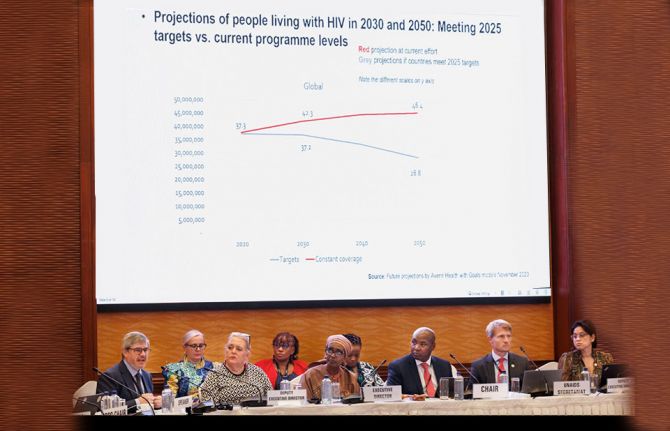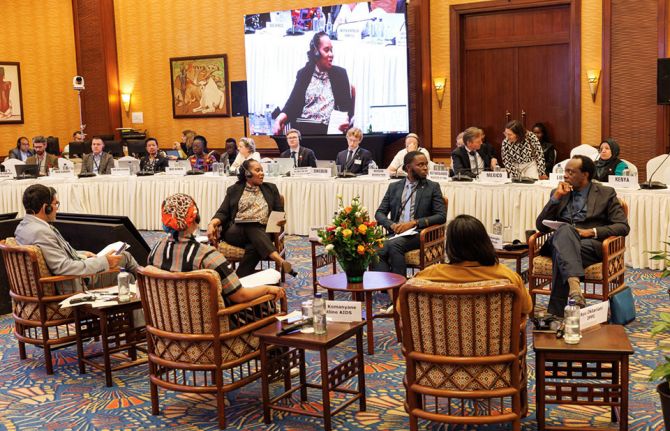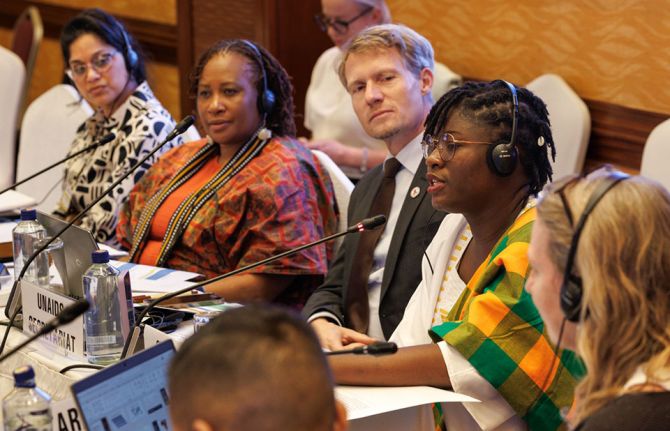



Press Statement
Global leaders commit to accelerating global efforts to end AIDS as a public health threat by 2030
13 December 2024 13 December 2024NAIROBI, 13 December 2024—The 55th meeting of UNAIDS’ Programme Coordinating Board (PCB) has concluded in Nairobi, Kenya, with Board members reaffirming their commitment to end the AIDS pandemic by 2030. Taking place in Africa for the first time in 18 years, the PCB meeting came at a critical moment for the AIDS response as new scientific advances bring the hope of ending the AIDS pandemic closer than ever and as UNAIDS embarks on developing the next Global AIDS Strategy and building political support for new 2030 HIV goals.
In her opening remarks to the Board the Executive Director of UNAIDS Winnie Byanyima said, “Let us make it possible for people living with HIV today to get the best science for HIV prevention and treatment that exists wherever they are in the world. Let us do this as a matter of sustainability to end this disease, as a matter of social justice, as a matter of human rights and as a matter of public health.”
In the session on Leadership in the AIDS Response, civil society and community activists expressed how breakthrough medicines must be shared equitably to reach the people most in need to accelerate progress towards ending AIDS. Countries demonstrated appreciation and solidarity with UNAIDS with some taking the opportunity to announce funding commitments to UNAIDS during the meeting. France announced a new €1.8 million commitment, via Expertise France, its public international cooperation agency, for equitable and sustainable financing for the AIDS response in southeast Asia, while the Netherlands announced a €23 million core funding contribution to UNAIDS for 2025. Denmark also declared a multi-year financial agreement for 2024—2029, with an expected annual contribution of DKK 40 million.
The Board underscored the need for the world to accelerate toward the 2025 targets. It also agreed to accelerate the Joint Programme’s work on sustainability and received an update on the ongoing work of the High-level panel on a resilient and fit-for-purpose UNAIDS Joint Programme in the context of the sustainability of the HIV response, with Board members confirming their expectation to consider bold and transformational recommendations at the next PCB on reforming the Joint Programme’s operating model.
A thematic segment on addressing inequalities in children and adolescents to end AIDS by 2030 was held on the last day of the PCB. Board members discussed how to close the persistent gaps and challenges in the response to AIDS in children and adolescents and explored strategies, innovations and programme successes to accelerate HIV prevention, treatment, protection, care and support for pregnant women, children and adolescents.
Sitsope Adjovi, a young HIV activist from Togo’s Network of Positive Children, Adolescents and Youth Innovating for Renewal (REAJIR+) said, “Young people are capable of doing what it takes and are ready to be engaged. it's no longer AIDS that's killing children, teenagers and young people. It's inappropriate policies, interventions and programmes that threaten our lives.”
There were 120 000 new HIV infections among children aged 0—14 in 2023 and 1.4 million children were living with HIV, 86% of whom are in sub-Saharan Africa. Just 57% of children living with HIV were on treatment in 2023 compared with 77% of adults and every 8 minutes a child died of an AIDS-related illness.
“When we know what works, when we know it is possible to end transmission of HIV to children, every new infection is a collective policy failure. A failure that we must address at every level of the HIV response by bridging the gaps between policy and delivery.” said Ms Byanyima.
The UNAIDS PCB brings together civil society, cosponsors and United Nations member states to help chart the co-creation of the future of the response to HIV, including the development of the next Global AIDS Strategy, the vision for 2030 and beyond.
The 55th meeting of the PCB was chaired by Kenya, with Brazil serving as the Vice-Chair and the Netherlands as Rapporteur. The 56th meeting to be held in June 2025 will be chaired by Brazil, with the Netherlands serving as Vice-Chair and Kenya as Rapporteur.
Read the Report to the Board by the UNAIDS Executive Director.
UNAIDS
The Joint United Nations Programme on HIV/AIDS (UNAIDS) leads and inspires the world to achieve its shared vision of zero new HIV infections, zero discrimination and zero AIDS-related deaths. UNAIDS unites the efforts of 11 UN organizations—UNHCR, UNICEF, WFP, UNDP, UNFPA, UNODC, UN Women, ILO, UNESCO, WHO and the World Bank—and works closely with global and national partners towards ending the AIDS epidemic by 2030 as part of the Sustainable Development Goals. Learn more at unaids.org and connect with us on Facebook, Twitter, Instagram and YouTube.
